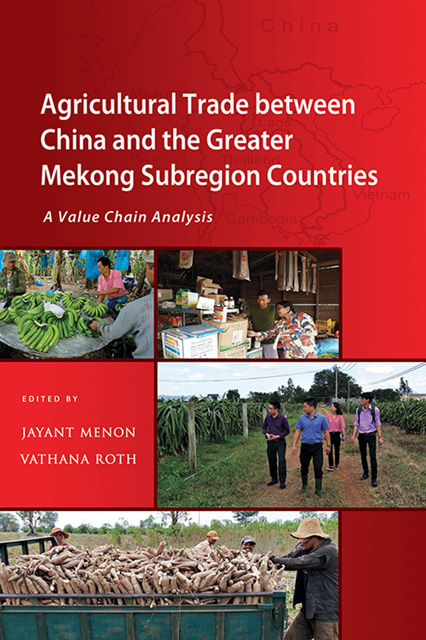Book contents
- Frontmatter
- Contents
- List of Tables
- List of Figures
- List of Annexes
- Foreword
- Preface
- Acknowledgements
- Abbreviations and Acronyms
- The Contributors
- 1 Agricultural Trade between China and the Greater Mekong Subregion Countries: An Overview
- 2 Economic Structural Change in China and the Implications for Agricultural Trade in the Lancang-Mekong Region
- 3 Agricultural Exports from Thailand to China: A Value Chain Analysis of Cassava and Durian
- 4 Agricultural Exports from Cambodia to China: A Value Chain Analysis of Cassava and Sugarcane
- 5 Agricultural Exports from Laos to China: A Value Chain Analysis of Rice and Cavendish Banana
- 6 Agricultural Exports from Myanmar to China: A Value Chain Analysis of Maize
- 7 Agricultural Exports from Vietnam to China: A Value Chain Analysis of Dragon Fruit and Coffee
- Index
Foreword
Published online by Cambridge University Press: 30 June 2023
- Frontmatter
- Contents
- List of Tables
- List of Figures
- List of Annexes
- Foreword
- Preface
- Acknowledgements
- Abbreviations and Acronyms
- The Contributors
- 1 Agricultural Trade between China and the Greater Mekong Subregion Countries: An Overview
- 2 Economic Structural Change in China and the Implications for Agricultural Trade in the Lancang-Mekong Region
- 3 Agricultural Exports from Thailand to China: A Value Chain Analysis of Cassava and Durian
- 4 Agricultural Exports from Cambodia to China: A Value Chain Analysis of Cassava and Sugarcane
- 5 Agricultural Exports from Laos to China: A Value Chain Analysis of Rice and Cavendish Banana
- 6 Agricultural Exports from Myanmar to China: A Value Chain Analysis of Maize
- 7 Agricultural Exports from Vietnam to China: A Value Chain Analysis of Dragon Fruit and Coffee
- Index
Summary
The Greater Mekong Subregion (GMS), which encompasses five Southeast Asian countries—Cambodia, Laos, Myanmar, Thailand and Vietnam (CLMV-T)—and China, is one of the most dynamic subregions in Asia. Apart from progressive market-oriented reforms, countries in the GMS have pursued broader regional integration through various multilayer cooperation frameworks. These include ASEAN, ASEAN-China Free Trade Agreement, China’s bilateral economic partnerships, the Regional Comprehensive Economic Partnership agreement and the Lancang- Mekong River Dialogue and Cooperation. While manufacturing trade and global value chain activities significantly benefit from these cooperation frameworks, agricultural trade especially between the CLMV-T and China is hindered by high barriers to trade in the form of tariff and non-tariff measures. Under these circumstances, what are the key constraints and challenges facing agricultural exports from the CLMV-T? What do China’s rapid structural change and development mean for agricultural trade within the subregion? How can the CLMV-T further integrate their agriculture and rural economies to tap into the colossal Chinese market? Those are the main questions explored in this volume.
This volume consists of six country papers covering each of the GMS countries. The papers were prepared collaboratively by local experts from leading research institutions within the subregion. The first chapter examines the rapid structural transformation and evolving economic policy taking place in China and their implications for agricultural trade within the subregion. Chapters 2–6 cover the CLMV-T country case studies, which examine a range of traditional and non-traditional issues relating to agricultural exports. The studies adopt broadly consistent value chain analysis frameworks to analyse not only key constraints and challenges in agricultural value chains from domestic to export market but also identify the key constraints and relationships between actors along the entire value chains.
Overall, the rapidly growing demand for food consumption represents huge opportunities for agricultural exports for the CLMV-T. However, those countries continue to struggle to address some of the domestic constraints related to absorptive capacity, requisite skills and market diversification for agricultural production and export. They also face difficulties in resolving non-tariff measures (NTMs) at the export market, especially with regard to more complex trade procedures such as obtaining SPS certificates; delays at the border; and lack of publicly available information on relevant NTMs.
- Type
- Chapter
- Information
- Agricultural Trade between China and the Greater Mekong Subregion CountriesA Value Chain Analysis, pp. xv - xviPublisher: ISEAS–Yusof Ishak InstitutePrint publication year: 2022



